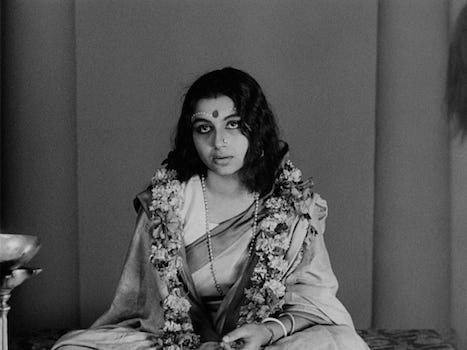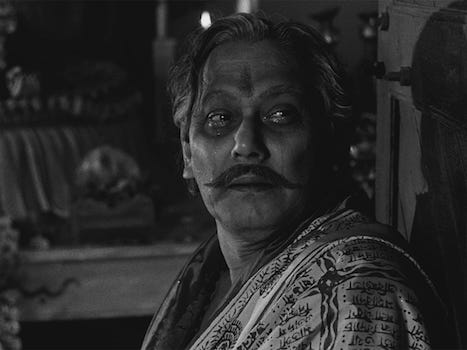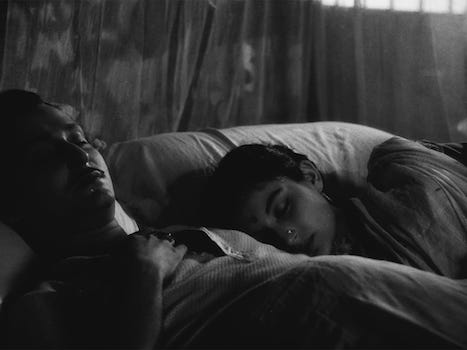| Reviews & Columns |
|
Reviews DVD TV on DVD Blu-ray 4K UHD International DVDs In Theaters Reviews by Studio Video Games Features Collector Series DVDs Easter Egg Database Interviews DVD Talk Radio Feature Articles Columns Anime Talk DVD Savant Horror DVDs The M.O.D. Squad Art House HD Talk Silent DVD
|
DVD Talk Forum |
|
|
| Resources |
|
DVD Price Search Customer Service #'s RCE Info Links |
|
Columns
|
|
|
Devi (1960): Criterion Collection
The Movie:

Eastern religious superstition and Western-influenced rationality come to a tragic collision in Satyajit Ray's beautiful and heartbreaking 1960 film Devi (The Goddess). Sharmila Tagore and Soumitra Chatterjee -- who had both made their screen debuts the year before in Apur Sansar, the conclusion to Ray's Apu Trilogy -- star as a young 19th Century couple whose life is not yet their own exactly. Chatterjee plays Umaprasad, an academic full of ambition and intelligence whose teenage wife Doyamoyee (Tagore) tends to Umaprasad's religious father while her husband is gone to the big city.
Devi's set-up is one that could conceivably introduce a comedy of manners. Uma's father, Kalikinkar (Chhabi Biswas), is clearly enamored with his daughter-in-law Doya; director Ray offers comfortable ambiguity as to whether Kalikinkar feels romantically moved by her or just feels an abundance of paternal pride, but the strength of the feeling is undeniable. One night, the old man has a dream in which he sees Doya as the goddess Kali. He awakes to declare his daughter-in-law is the human reincarnation of the goddess, leading the whole village to worship her and bring their sick to be healed. When Uma returns from taking exams, he is horrified to see his wife being worshipped. He plots to run away with her, but Doya isn't entirely sure she isn't the goddess at this point either.
Despite the absurd elements in the story, Ray is deadly serious. This foolish lark of an old man will lead to trauma, madness, and death. Ray's acute sensitivities to the social structures of the family and the period is masterful and gave me flashes of Anton Chekhov and Ingmar Bergman.
The film's cruelest irony is that Kalikinkar is constantly declaring that his daughter-in-law Doya is gifted with incredible power, but in reality, as patriarch, he holds all the power. Doya dare not speak up and say that she is not a goddess. Even Kalikinkar's older son who lives in the house, Taraprasad (Purnendu Mukherjee), feels pressured to be a yes-man to his father's delusions so that he does not lose financial support. Like Uma, Ray sees a clear need to move beyond the old ways and the old superstitions if India (and -- let's be honest -- the human world) is going to survive.
Sharmila Tagore went on to act in over 100 films (including Ray's The Hero), but this was only the second appearance onscreen for the untrained actress. She delivers an astonishingly fine performance that is communicated mostly through her facial expressions. She has a pair of eyes that were created for cinema. They are sweet and bedazzling in early scenes, scared and withdrawn as the film progresses, and ultimately wild and vacant in Devi's tragic final passages. In interviews, Tagore has stated that this is her favorite performance, and it is easy to see why.

The Blu-ray
Devi is packaged with a foldout featuring an essay by Devika Girish.
The Video:
So many of the elements of Satyajit Ray's films have been physically mistreated and destroyed over the years, long making proper restorations seem impossible. Criterion's presentation of The Apu Trilogy is miraculous for just that reason. Devi was apparently in a similarly ragged state. There are clear signs of deep wear and tear at various moments throughout this AVC-encoded 1080p 1.37:1 presentation, but there has clearly been significant work to stabilize the image, and in general, this presentation excels in depth, clarity, and contrast. A splendid restoration.
The Audio:
A bit of surface noise and some age-related boxiness, but the Bengali LPCM mono audio (with optional English subtitles) is satisfying restoration with clean dialogue, natural-sounding ambience, and well-integrated music.
Special Features:
(HD, 16:20) - Interviews with the actors shot in 2013, in which they discuss their experiences working with Satyajit Ray and their impressions of his work.
Final Thoughts:
In the supplementary materials on Criterion's Devi disc, a quote from director Satyajit Ray is mentioned in which he states that Westerners will have to learn about this specific period of Indian/Bengal culture to fully unpack what the film is exploring. I suspect there are further layers to be mined from the film, but Ray is such a gifted and sensitive dramatist that none of the situations in Devi feel, well, foreign. The ideas and feelings here translate with elegant clarity. Criterion's restored presentation and thoughtful supplements are satisfying and enriching. Highly Recommended.

Justin Remer is a frequent wearer of beards. His new album of experimental ambient music, Joyce, is available on Bandcamp, Spotify, Apple, and wherever else fine music is enjoyed. He directed a folk-rock documentary called Making Lovers & Dollars, which is now streaming. He also can found be found online reading short stories and rambling about pop music.
|
| Popular Reviews |
| Sponsored Links |
|
|
| Sponsored Links |
|
|
| Release List | Reviews | Shop | Newsletter | Forum | DVD Giveaways | Blu-Ray | Advertise |
|
Copyright 2024 DVDTalk.com All Rights Reserved. Legal Info, Privacy Policy, Terms of Use,
Manage Preferences,
Your Privacy Choices | |||||||













